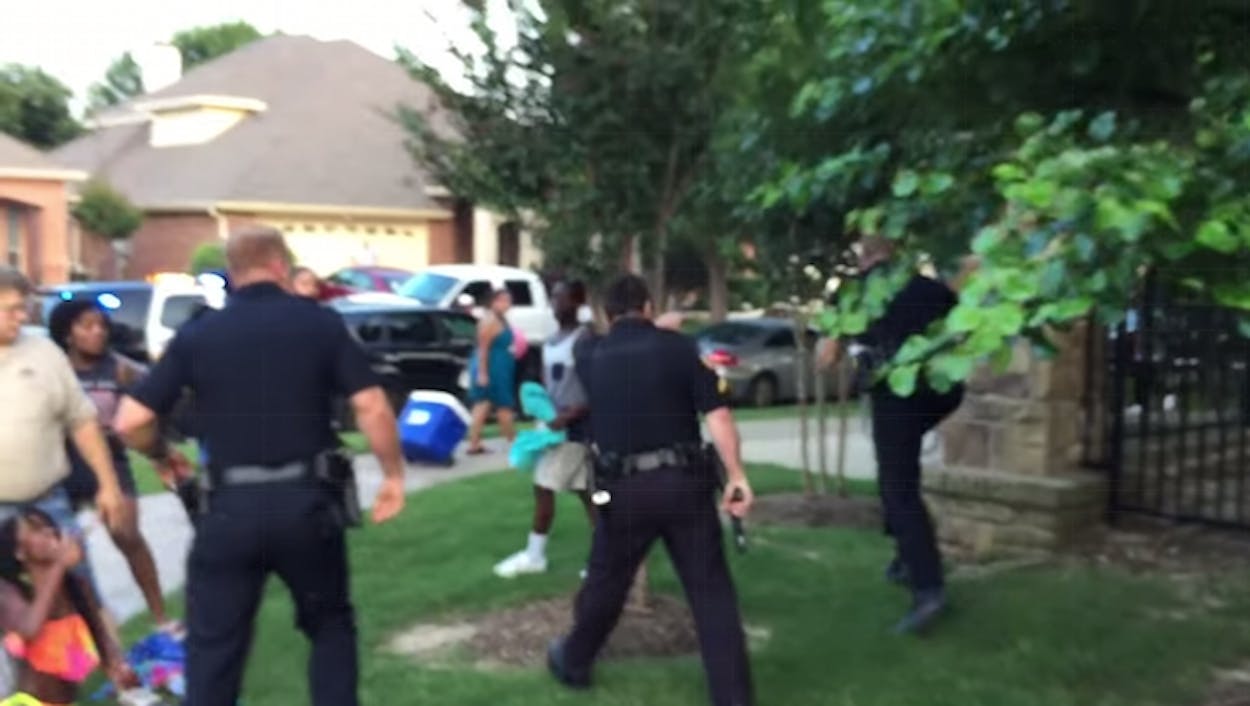In June 2015, the North Texas city of McKinney—which, until then, was perhaps best known as the hometown of former professional wrestler Haystacks Calhoun—suddenly became famous. A video shot near a swimming pool in a gated community showed a police officer, whom the police chief would later declare “out of control,” responding to a complaint about a group of black teenagers at the pool.
The video shocked the nation. The officer, later identified as former police corporal Eric Casebolt, commands the teens to leave, and when a fifteen-year-old girl tells him that she needs to find her glasses, she’s grabbed by the officer. Moments later, she’s thrown to the ground and grabbed by the hair. When two boys approach, he pulls his gun on them, leading the girl to scream. When she does so, he grabs her again by the back of the head and slams her face-first to the ground, at which point he holds her down by planting his knee on her back as she cries, “I’m not fighting you.” The contrast between the teens, who were wearing bathing suits and enjoying a day at the pool, and the actions of Casebolt help explain why the McKinney pool party was such a big story.
The story has continued to play out over the days, weeks, and months. following the incident. Casebolt resigned a few days later; a woman who was seen in the video fighting with another black teenager hired celebrity lawyer Gloria Allred to represent her, though it doesn’t appear that she was ever involved in legal action; the Texas Rangers investigated Casebolt, presented their findings, and ultimately a grand jury declined to indict the officer. The woman who organized the party moved to Chicago and continued to pursue her modeling career. And Dajerria Becton, the teenager who was slammed to the ground by Casebolt in the video, filed a $5 million lawsuit against the officer, the police department, and the city of McKinney this week.
The lawsuit is a long time coming. Becton didn’t begin by talking about lawsuits. On the one-year anniversary of the incident last June, she, her family, and their lawyer, Kim T. Cole, held a press conference outside of the McKinney Police Department. They told reporters that they wanted to see Casebolt charged and held accountable for his actions.
Several weeks later, the grand jury declined to indict Casebolt. At that point, Becton and her attorney held another press conference, this time announcing that they intended to pursue civil and personal injury lawsuits against Casebolt, the city of McKinney, and the McKinney Police Department.
Texas has a two-year statute of limitations on these kinds of lawsuits, which helps explain why she decided to file now—there’s only five months before that expires—and the move comes after attempts to settle with the city of McKinney independent of the suit against Casebolt. She sought a settlement from the city, with her lawyer saying that she “would be best served at a private school for the remainder of her high school years due to the social backlash” from the incident, according to the Dallas Morning News. The documents the paper obtained indicate that the teenager suffers from another condition (the details of which were redacted) as a result of the incident. Becton sought a $2.5 million settlement from the city, which never entered into an agreement.
The lawsuit filed this week alleges that the city of McKinney and its police department had a responsibility to better train Casebolt and his fellow officers, and that Casebolt used excessive force in his encounter with Becton. This isn’t the first time that Casebolt—whose current occupation is unknown—has been sued in a case that involves race. In 2008, an African-American man named Robert Earl Brown filed a suit against Casebolt alleging racial profiling and excessive force. That suit was dismissed in 2009. It’s also not the first time that the relationship between the city of McKinney and the officer it employed came under scrutiny—in June 2015, after the incident, Gawker filed an open records request seeking Casebolt’s records and any email correspondence about his behavior. The city responded with an invoice asking for $79,000 to perform an email search and release his records. The city later claimed that the figure it cited to Gawker was “erroneous.”
At a press conference this afternoon, Becton’s attorney explained the impact that the incident has had on her client. She talked about how Becton receives death threats online, and how she feels that police aren’t a safe option for her if Becton seeks help from them. She explained that the injuries Becton suffered to her neck and back weren’t severe and have healed, but that the psychological damage will continue. She also noted that she and Becton’s family were unable to obtain a copy of the report from the Texas Rangers investigation into Casebolt, and that part of the reason she’s filing the suit is to get the information from the investigation as part of the discovery process.
The city of McKinney says that it plans to defend the lawsuit. How, specifically, they plan to defend behavior that their own police chief described as “indefensible” remains to be seen.








